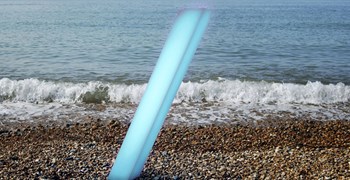Invisible You: Eden Project looks down the lens to create show on The Human Microbiome
This article originally appeared on Culture24.
A new exhibition at The Eden Project lifts the lens on the bacteria inside us. Here are works by some of the dozen artists taking part
The Eden Project’s curatorial intentions towards championing symbiosis have been missing a trick. According to organisers at Cornwall’s most ecocentric crater, Eden had overlooked the commensal microbes evolving inside their own ecosystem.
Fortunately, a link-up with the Wellcome Trust is allowing them to address the deficiency by commissioning 12 artists to create new works within a microbiome. Porcelain viruses, a mass dance, a rotting face, belly button portraiture and swabbing all figure.
The suggestion is that our own inner bits can lead us to happier, healthier lives, drawing obvious parallels with looking after the environment.
Aimee Lax, Phages
 Porcelain, acrylic glass
Porcelain, acrylic glassBacteriophages are viruses that only attack specific bacterial cells. They land on the cells, inject their nucleic acid (DNA or RNA), replicate and burst through the cell wall, destroying the cell in the process. They are being researched as an alternative to antibiotics.
Anna Dumitriu, Don't Try This at Home
 Textiles stained and patterned with gut bacteria, anatomical glass, prepared faecal transplant, carved wooden box
Textiles stained and patterned with gut bacteria, anatomical glass, prepared faecal transplant, carved wooden boxAll the biological elements have been sterilised. This sculptural installation explores the complex story of faecal microbiota transplants, used for the treatment of long-term infections caused by the superbug Clostridium difficile. It was made as part of a residency at the laboratory with the Healthcare Associated Infection Research Group at the University of Leeds and Leeds Teaching Hospitals Trust.
Bill Wroath, 5e+16
 Interactive film installation
Interactive film installationTo depict the internal mechanisms of our bodies, Wroath and his team translated how bacteria move and communicate into a choreographed dance. 5e+16 brought together hundreds of volunteers from across the local community to create a mass dance film reflecting the interdependence between us, microbes and the wider planet.
Joana Ricou, César
 C-print of bacterial painting
C-print of bacterial paintingSwabbing individual bellybuttons created this series of photographs. Each piece is created using the microbiome of the subject as a painting medium, exploring how the microbiome blurs our fundamental boundaries: between human and non-human, organism and environment, between generations, and between all of us.
Rogan Brown, Cut Microbe
 Handcut paper
Handcut paperThis paper sculpture is based on a single cell bacterium, Escherichia coli. E-coli are frequently found in the lower intestine of humans and other warm-blooded animals. Most live in the gut quite harmlessly but others can cause illness.
Paul Spooner, GIT
 Automata
AutomataOur body is a tube. Our GIT - gastrointestinal tract - is teaming with microbes intrinsically linked to many of our inner workings. This automata looks at the insides of our bodies and the journey microbes take through it.
Mellissa Fisher, Microbiological Portrait
 Agar, bacteria, film
Agar, bacteria, filmThis sculpture, made from a cast of the artist’s face, is a living artwork; the bacteria from her skin grow and mix with the colonies of microbes present in the environment. It grows and dies, reflecting the cycle of life.
What do you think? Leave a comment below.More from Culture24's Science and Nature section:Penis Worm was a fearsome Cambrian period predator with teeth like a cheese grater, say palaeontologists"The ultimate in speed sailing": Moth master White aims to break women's nautical speed mileA mermaid model of a sprite: The Horniman Museum's 19th century monkey-fish
Source: http://www.culture24.org.uk/science-and-nature/art527858

 Porcelain, acrylic glass
Porcelain, acrylic glass Textiles stained and patterned with gut bacteria, anatomical glass, prepared faecal transplant, carved wooden box
Textiles stained and patterned with gut bacteria, anatomical glass, prepared faecal transplant, carved wooden box Interactive film installation
Interactive film installation C-print of bacterial painting
C-print of bacterial painting Handcut paper
Handcut paper Automata
Automata Agar, bacteria, film
Agar, bacteria, film











